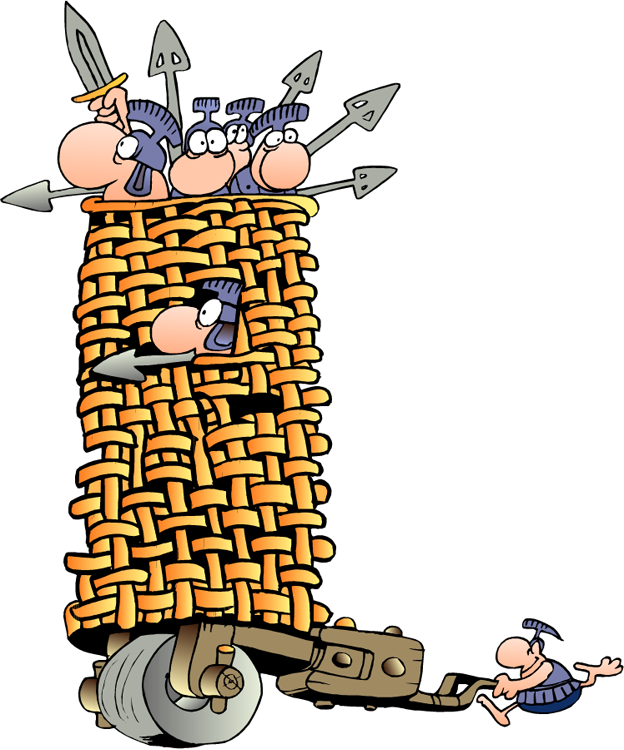Haste Makes Waste, Just Ask Rufus
 June 14, 2009
June 14, 2009
Avoid doing things in a hurry,
since acting in haste will lead to many mistakes.

Rufus and his five brothers were very happy. They had always wanted to join the army so they could defend their country. But the country had been at peace so the king had little need for new soldiers. Also the brothers didn’t have any helmets and weapons. Nor a chariot or a horse to pull it.
So why were they so happy? The king had announced that since many soldiers had retired, he needed new ones! The brothers were happy because now they would be able to protect the country and its citizens. Rufus quickly called Acme Armor Supply to place an order. The brothers were in luck. Acme had a special promotion and was giving away a free spear with every helmet and armor set!
Now the only problem was transportation. This one had them stumped and gave Rufus a few sleepless nights while waiting for the express delivery from Acme. Then Rufus had an idea. (He may have been the youngest, but he had always been the one with the bright ideas. His brothers were sweet, but a bit slow.)
Anyhow, Rufus was out in the stable (actually it was a shed since they had no horses) poking around and thinking when he noticed the big basket they had all woven while in school. Rufus eyed it and then looked at the stone grinding wheel near it. He had it! Excitedly, he began rummaging around until he found an old axle and the spare handle for the plow.
He got the brothers together and they began to work under his direction. Soon they had everything together and boy was it a beauty. Three of the brothers ran next door to ask if they could borrow their neighbor’s horse. Being a good citizen (and won over by the gleeful brothers) he agreed. The brothers brought the horse home and went to hitch it up.
But there was a slight problem.
In haste, Rufus’ brothers had hitched the handle and axle to the back of the basketariot (their name for their new vehicle) instead of the front! The brothers were all standing around scratching their heads, and Rufus was looking particularly pained when the delivery van drove up. The driver gave them their packages, congratulated them on their patriotism, and drove off before they could try out the spears.
The brothers were delighted because now they could join the army. Then they remembered they couldn’t hitch the horse to the basketariot. Rufus had another idea. He’d push! The brothers ran happily into the house, put on their armor, and quickly kissed their parents goodbye. They ran out and piled into the basketariot while Rufus went behind to push.
But there was a slight problem.
They had forgotten their helmets. Rufus ran muttering into the house, grabbed the helmets, and finally they were off.
But there was a slight problem.
Rufus couldn’t see where he was going and all five of his brothers were excitedly yelling directions at the same time. Rufus stopped pushing, rolled his eyes, and through clenched teeth asked for his spear. He cut a hole in the basket and called it the “navigator’s window.” Only the brother whose turn it was to sit at the window could give directions. Delighted with this arrangement, everyone resumed their position and off they quickly went.
But there was a slight problem.
None of the five brothers who were to take turns as navigators knew where they were supposed to go. So they were making good time, but probably going in the wrong direction.
Rufus leaned over and banged his head a few times on the basketariot handles and again muttered under his breath. But he soon got himself under control and ran to get directions from a passerby. When he returned, he carefully told the brothers where the army was. He made them repeat the directions to be sure they all knew where they were going. They quickly started off again and soon came to where they were to cross a river.
But there was a slight problem.
The brothers had gotten confused (what can I say) and they were in the wrong spot. It turned out that they should have crossed two miles back. Rufus, who was now gnashing his teeth and tugging at his hair, quickly turned the basketariot around. Back they went to where they had just come from. They turned where they should have in the first place and crossed the river. By this time, the brothers were all holding on for dear life because Rufus was running so fast the basketariot was almost airborne. They five brothers spotted the army camp and cheered Rufus on to where the recruitment desk was set up.
But there was a slight problem.
As Rufus dragged himself up to the desk, the recruitment officer looked at the muttering, bedraggled, mud-splattered and red-faced Rufus, and then turned to his five grinning brothers in the basket. The army officer shook his head and stamped “REJECTED, No Appeal” on their applications.
MORAL
Acting in haste usually ends in mistakes and disappointment.
